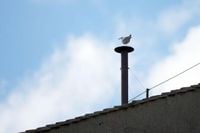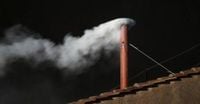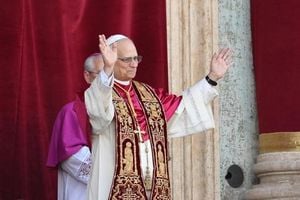A new pope was chosen in the Vatican on Thursday, May 8, 2025. At 13:08 Brasilia time, white smoke rose from the chimneys of the Sistine Chapel, indicating that the Roman Catholic Apostolic Church has a new leader after four ballots. Approximately 20,000 people awaited the result in St. Peter's Square.
The identity of the North American Robert Prevost as the 267th pope was revealed one hour later. The new pontiff made his first appearance as leader of the Catholic Church under the name Leo XIV. Following the announcement, he performed the "urbi et orbi" blessing, meaning "to the city and to the world," addressing the faithful gathered in the square.
This selection comes just 17 days after the death of Pope Francis, who passed away on April 21, 2025, at the age of 88 due to a stroke and heart failure. The conclave, which began on May 7, 2025, saw 133 cardinals participating in the voting process. The new pope was chosen by at least two-thirds of the voters, meaning he received a minimum of 89 votes.
After a series of three unsuccessful rounds of voting that resulted in two instances of black smoke, the white smoke finally signaled a decision had been made. The anticipation was palpable as thousands gathered in St. Peter's Square, many arriving early in the morning to witness the historic moment.
The conclave process is shrouded in tradition and secrecy, with cardinals voting in isolation. They are allowed up to four votes per day, with two in the morning and two in the afternoon. During this period, communication with the outside world is strictly prohibited, ensuring that the cardinals are not influenced by external factors.
As the cardinals returned to the Sistine Chapel for the final rounds of voting, there was a sense of urgency. Previous conclaves had varied in length, with some lasting mere hours while others extended over days. The average duration since the 20th century has been around three days, with the last two conclaves resulting in the election of Pope Benedict XVI in 2005 and Pope Francis in 2013, concluding in just two days.
On the day of the election, the cardinals began with an early vote at approximately 5:30 AM Brasilia time. However, the first voting round did not yield a consensus, leading to a second round shortly after at 7 AM, which again resulted in black smoke. The atmosphere in the chapel was tense, as all eyes were on the chimney, waiting for the decisive signal.
Finally, around noon, the smoke rose again, and this time it was white, confirming that a new pope had been elected. Cardinal Dominique Mamberti, the protodeacon, announced the news to the world from the balcony of St. Peter's Basilica. The traditional Latin phrase "Habemus Papam" was declared, meaning "We have a pope!" This moment is a significant tradition, marking the official announcement of the new pope's identity.
In the ensuing moments, the new pope was taken to the "Room of Tears," where he dressed in the traditional white cassock. This room, named for the emotional weight of the occasion, is where the new pontiff reflects on his new responsibilities. Cardinal Mamberti then asked him the pivotal question: "How do you wish to be called?" The choice of the name Leo XIV reflects a connection to the Church’s history and traditions.
As he appeared on the balcony for the first time, the new pope addressed the crowd, offering his blessing and calling for unity among the faithful. His message resonated deeply, especially in light of the challenges the Church faces in today's world.
The election of Pope Leo XIV marks a pivotal moment for the Catholic Church, poised to lead over 1.4 billion faithful worldwide. The new pontiff's background includes a rich history of service and dedication to the Church, having previously served as the prefect of the Dicastery for Bishops.
In the lead-up to the conclave, speculation about potential candidates was rife. Prominent figures included Pietro Parolin, the Vatican's Secretary of State, and Luis Antonio Gokim Tagle, a former archbishop known for his advocacy for the marginalized. Other notable names included Jean-Marc Aveline of France and Matteo Maria Zuppi of Italy, both of whom have been recognized for their diplomatic skills and commitment to social issues.
The atmosphere during the conclave was charged with a sense of responsibility, as the cardinals grappled with the legacy of Pope Francis and the future direction of the Church. Giovanni Battista Re, the dean of the College of Cardinals, emphasized the need for a united Church during the Pro eligendo Pontifice mass, held prior to the conclave. His message underscored the importance of maintaining unity amid diversity within the global Church.
As the world turns its attention to the new pope, many hope that Leo XIV will continue to foster dialogue and inclusivity, addressing the pressing issues that face the Church and its followers today. The journey ahead is expected to be challenging, yet filled with opportunities for growth and renewal.
The selection of a new pope is always a moment of great significance, not just for the Catholic Church but for the global community. With the election of Leo XIV, many are eager to see how he will navigate the complexities of modern faith and the needs of his followers.






